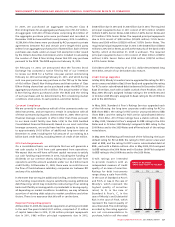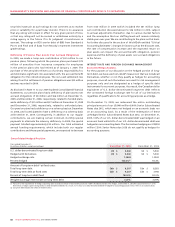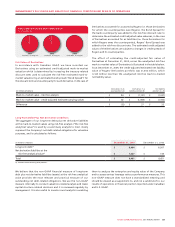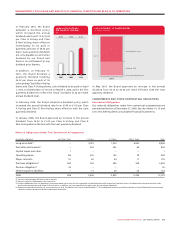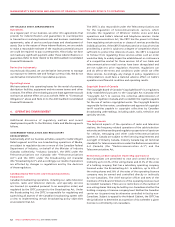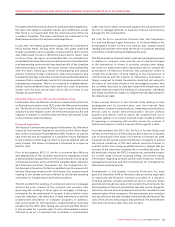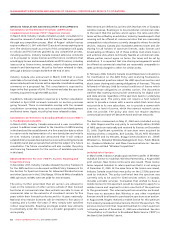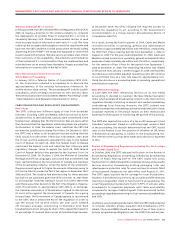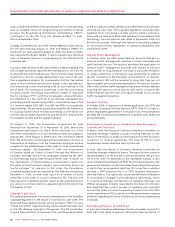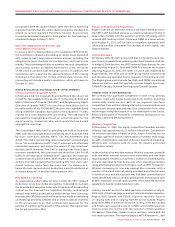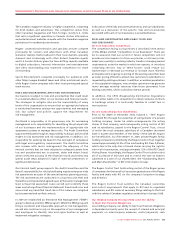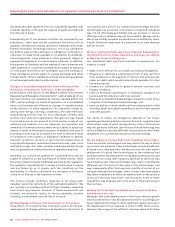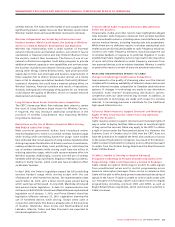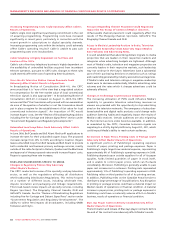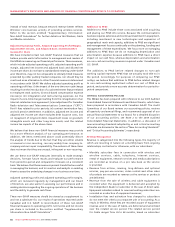Rogers 2009 Annual Report Download - page 52
Download and view the complete annual report
Please find page 52 of the 2009 Rogers annual report below. You can navigate through the pages in the report by either clicking on the pages listed below, or by using the keyword search tool below to find specific information within the annual report.
56 ROGERS COMMUNICATIONS INC. 2009 ANNUAL REPORT
MANAGEMENT’S DISCUSSION AND ANALYSIS OF FINANCIAL CONDITION AND RESULTS OF OPERATIONS
It also considered whether it should impose a one-on-one spending
ratio on Canadian versus U.S. programming and whether it should
increase the Broadcasting Distribution Undertaking (“BDU”)
contribution to the LPIF from the already-decided 1% level,
effective September 2009.
In a May 15, 2009 decision, the CRTC renewed Media’s Citytv licences
for one year (expiring August 31, 2010) and Media’s OMNI TV’s
licences for six years (expiring August 31, 2015), the latter of which
was requested by Rogers Media. It rejected applying a spending
ratio on Canadian versus U.S. programming for the 2009 and 2010
broadcast year.
In a July 6, 2009 decision on the other matters in the proceeding, the
CRTC further decided to raise the LPIF contribution to 1.5% from 1%
for the 2009 and 2010 broadcast year. The Commission also reversed
its position on fee-for-carriage stating that it was “now of the view
that a negotiated solution for compensation for the free market
value of local conventional television signals is also appropriate”
and announced a new proceeding with an oral hearing in the
fall of 2009. The Commission noted that in the new proceeding
it would consider imposing a requirement on BDUs to negotiate
Fee-for-Carriage (“FFC”) with the broadcasters using arbitration
for settlement if a fee could not be successfully negotiated. The
proceeding would consider tying a BDU’s continued carriage of the
U.S. network signals (CBS, NBC, Fox, ABC and PBS) to a successfully
negotiated fee. The proceeding would also establish the framework
for a group-based licence renewal proceeding in 2010 which will
consider group-based expenditures and exhibition requirements
for Canadian content and the digital transition.
On August 11, 2009, the Commission rescheduled the Oral
Hearing from September 29 to November 16, 2009. Where the
Commission had stated in its July 6, 2009 notice that it is of the
view that compensation for local conventional television signals is
appropriate, in the August 11, 2009 notice, the Commission stated
that “the Commission will proceed with an examination de novo of
the question of whether or not the Commission should put in place
a regime for the establishment of fair value for local conventional
television signals”. On September 17, 2009, the Government
of Canada issued an Order-in-Council through the Minister of
Canadian Heritage and Official Languages requesting the CRTC
to hold hearings and provide the government with “a report on
the implications of implementing a compensation regime for
the value of local television signals, more commonly known as
fee-for-carriage.” In response to this order, the Commission
scheduled another public process with an Oral Hearing commencing
December 7, 2009, to seek wide input on a number of items
identified in the Order-in-Council relevant to FFC. The two oral
hearings were completed and the report to the government and
any decisions on these matters is expected before the end of the
first quarter of 2010.
Copyright Legislation
The federal government introduced amendments to the Canadian
copyright legislation in the House of Commons in June 2008. The
Bill would have required Internet service providers (“ISPs”) to use a
“notice and notice” regime whereby notices would have been sent
to the ISPs alleging copyright infringement. The ISP would then
forward these notices to its customers. This would have been similar
to the procedure currently used by us and therefore would not have
imposed any new costs. The copyright legislation would also have
legalized forms of copying currently used by Cable’s customers,
but would not have permitted cable operators to use network PVR
technology. Since an election was called in September 2008, this
Bill did not proceed. Although the federal Government pledged
to reintroduce similar legislation, no proposed legislation was
introduced in 2009.
Internet Traffic Management
In October 2009, the CRTC issued Telecom Decision 2009-657 on
Internet traffic management practices for both wholesale and
retail Internet services. The decision permitted the application of
network traffic management practices with respect to Internet
access services so long as they do not result in unjust discrimination
or undue preference. A framework was established to address
specific complaints of discrimination and preference. In response
to a complaint, ISPs will be required to show that they are not
favouring their own content and applications. The decision requires
ISPs to disclose their traffic management practices on their websites
including the speed to which peer-to-peer traffic is slowed. We
believe that this decision does not require changes to our current
traffic management practices.
Essential Facilities
In January 2009, in response to a review application, the CRTC did
amended its Essential Services Decision (CRTC 2008-17) in order to
permit negotiated agreements for certain services. The amendment
provides the incumbent local telephone companies with additional
pricing flexibility.
Parliamentary Committee on Canadian Heritage Hearings on
Conventional Television
In March 2009, the House of Commons Standing Committee on
Canadian Heritage initiated a study including hearings on the
future of television in Canada and the impact of current economic
conditions on local programming. The issue of FFC for local
broadcasters was an identified topic in the study.
In June 2009, the House of Commons Standing Committee on
Canadian Heritage released its report. The report did not contain a
recommendation on FFC but did recommend that the LPIF go from
1% to 2.5% with 1% dedicated to the CBC/Radio Canada. It also
recommended the elimination of CRTC Part II broadcasting fees. The
government members on the Committee filed a dissenting opinion
in which they recommended rejecting FFC in any form, whether
through a CRTC-imposed fee or a CRTC-imposed negotiation
with arbitration. The report also recommended that broadcasters
be permitted to engage in pharmaceutical advertising, which
is currently prohibited. The Minister of Canadian Heritage and
Official Languages formally responded to the Report in October
and identified the current process of updating the Copyright
Act and the Order-in-Council requesting a report from the CRTC
on the implications of FCC as the focus of the government’s ongoing
initiatives regarding the future of television and local programming
in Canada.
Third Party ISP Access to Cable Plant
In a broad proceeding addressing Internet wholesale services for
both ILECs and cable companies initiated by Telecom Notice of



